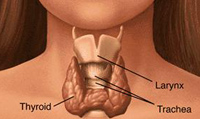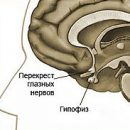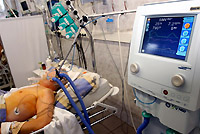Chronic autoimmune thyroiditis arises due to the formation of antibodies in the body of its own thyroid gland. In most cases, the disease occurs at a young age in persons having a hereditary predisposition. Clinical manifestations of autoimmune thyroiditis are diverse and dependent on the stage of the disease.
Content
Causes of chronic autoimmune thyroiditis
Chronic autoimmune thyroiditis or lymphomatous thyroidity is an inflammatory disease of the thyroid gland of autoimmune nature, when antibodies and lymphocytes damaging cells are formed in the human body. (Normally, the antibody in the human body is produced only on an alien substance).
 Most often, autoimmune tyrotitis occurs in patients from 40 to 50 years, and in women ten times more often than in men. This is the most common inflammatory disease of the thyroid gland. And recently, autoimmune thyroid suffers more than more patients of young age and children.
Most often, autoimmune tyrotitis occurs in patients from 40 to 50 years, and in women ten times more often than in men. This is the most common inflammatory disease of the thyroid gland. And recently, autoimmune thyroid suffers more than more patients of young age and children.
It is believed that autoimmune lymphomatous thyroiditis has a hereditary nature. Relatives of patients with thyaredite hasimoto are often sugar diabetes, various thyroid diseases. But for the implementation of hereditarily, additional adverse external factors are needed. These are respiratory viral diseases, chronic foci of infection in palatine almonds, sinuses of nose affected by caries teeth.
Promotes the development of autoimmune thyroids a long uncontrolled reception of iodine-containing drugs, the effect of radiation radiation. Under the action of provoking factor in the body, clones of lymphocytes are activated, which launch the reaction of the formation of antibodies to its own cells. The outcome of this process is damage to the thyroid cells (thyrocytes). The contents of follicles fall from damaged thyroid cells into the blood: hormones, destroyed parts of the inner organelles cells, which in turn contribute to the further formation of antibodies to thyroid cells. The process acquires a cyclical character.
Basic symptoms of the disease
Chronic autoimmune thyroiditis very often flows without any clinical manifestations. Early signs include unpleasant sensations in the field of thyroid gland, the feeling of coma in the throat when swallowing, a feeling of pressure in the throat. Sometimes there are unscrews in the field of the thyroid gland, mainly when transshipment of the thyroid gland. Some patients can complain about light weakness, joint pain.
If the patient appears hyperthyroidism (due to the high emission of hormones into blood during damage to the thyroid cells), the following complaints arise:
- Hand shakes
- Heart rate frequency
- sweating
- Enhance arterial pressure
More often the state of hyperthyroidism arises at the beginning of the disease. Subsequently, the function of the thyroid gland may be normal or several reduced (hypothiosis). Hypothyroidism usually occurs after 5-15 years from the beginning of the disease and the degree of it fell upon under adverse conditions. With sharp respiratory viral diseases, in mental and physical overloads, exacerbation of various chronic diseases.
Depending on the clinical picture and the size of the thyroid gland, chronic autoimmune thyroiditis hasimoto is divided into forms:
- Atrophic form
- hypertrophic form
In atrophic form of increasing the thyroid gland there is no. It is found in most patients, but more often in old age and in young patients who were subjected to radioactive irradiation. Usually this form is clinically accompanied by a decrease in the function of the thyroid gland (hypothiosis).
The hypertrophic form of autoimmune thyroid is always accompanied by an increase in the thyroid gland. The thyroid gland can be evenly increased throughout the volume (diffuse hypertrophic form), or the presence of nodes (node form) is noted. Perhaps a combination of diffuse and nodal forms. The hypertrophic form of autoimmune thyroid may be accompanied by thyrotoxicosis at the beginning of the disease, but more often the thyroid function is normal or reduced.









